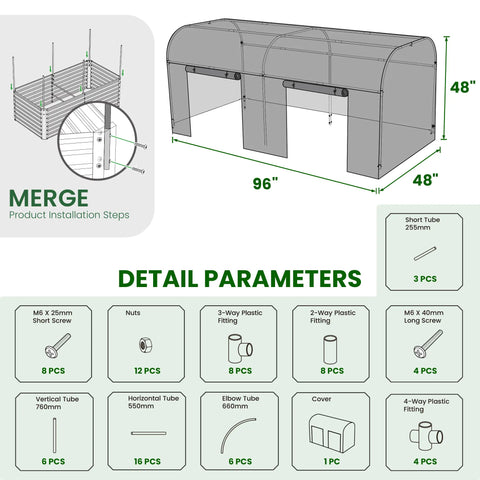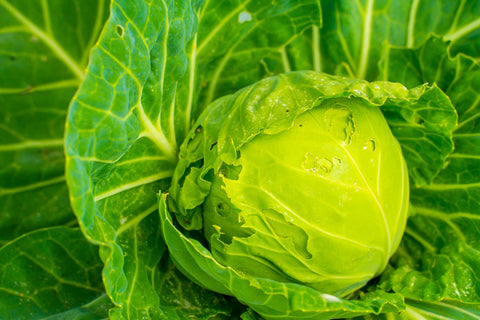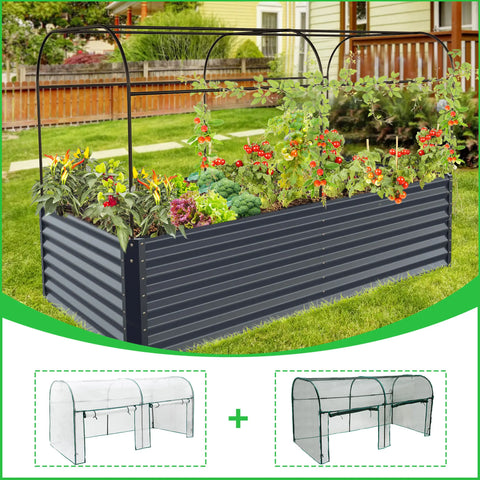Organic gardening is not just a way of growing plants; it's a lifestyle and a commitment to working with nature, not against it. From reducing environmental impact to producing healthier, chemical-free food, organic gardening offers a host of benefits. And when it comes to organic gardening success, garden beds can be your secret weapon. In this blog, we'll explore the principles of organic gardening and how you can achieve it with the help of garden beds, all while promoting eco-friendly practices and using innovative designs for your gardening needs.The following content also has some reference value for raised garden beds.

Organic Gardening Essentials
Before we delve into the role of garden beds in organic gardening success, let's first understand the core principles of organic gardening:
- No Synthetic Chemicals: Organic gardening is built on the foundation of eschewing synthetic chemicals like pesticides and fertilizers. Instead, it relies on natural methods to nurture plant health and ward off pests.
- Soil Health: Healthy soil is paramount in organic gardening. It's not just a medium for plants to grow; it's a living ecosystem. Organic gardeners focus on improving soil structure and fertility through organic matter and beneficial microorganisms.
- Biodiversity: Promoting biodiversity in your garden is essential. This includes planting a variety of crops and encouraging beneficial insects and pollinators to thrive.
- Sustainability: Organic gardening emphasizes sustainability, which means considering the long-term impact of your gardening practices on the environment and surrounding ecosystems.
- Holistic Pest Management: Organic gardeners use methods like companion planting and biological controls to manage pests rather than relying on chemical sprays.
The Role of Garden Beds in Organic Gardening Success

Now, let's explore how garden beds, particularly raised garden beds, contribute to the success of organic gardening:
- Soil Control: Raised garden beds provide better control over your soil's composition. You can customize the soil to meet the specific needs of your plants. This ensures that the soil is nutrient-rich and well-draining, fostering healthy plant growth.
- Improved Drainage: The elevation of garden beds promotes better drainage, preventing issues like root rot and waterlogged soil, common problems in ground-level gardens.
- Weed Management: Raised garden beds can reduce weed growth, making it easier to maintain your garden without resorting to chemical herbicides. This saves both time and effort.
- Soil Quality: By using high-quality organic soil mixes in your raised garden beds, you're ensuring that your plants have access to the nutrients they need without synthetic additives.
- Extended Growing Season: In colder climates, raised beds warm up faster in the spring, which extends the growing season and allows you to start planting earlier.
- No Soil Compaction: Traditional gardening in rows often leads to soil compaction from walking between rows. Garden beds provide a space-saving solution that eliminates this issue.
Secrets to Organic Gardening Success with Garden Beds

Achieving organic gardening success with garden beds involves following these essential tips:
- Quality Garden Bed Construction: Invest in high-quality materials for your garden beds, such as galvanized steel, which is durable and resistant to corrosion, ensuring they last for years.
- High-Quality Organic Soil Mix: Use a top-quality organic soil mix in your garden beds. It should be well-draining, nutrient-rich, and free from synthetic chemicals.
- Crop Rotation: Implement a crop rotation plan to prevent soil depletion and minimize the risk of pests and diseases. Rotate your crops within your garden beds to maintain soil health.
- Compost and Mulch: Regularly add compost and mulch to your garden beds. Compost enriches the soil with nutrients and beneficial microorganisms, while mulch helps retain moisture and suppress weeds.
- Natural Pest Control: Embrace natural methods of pest control, such as introducing beneficial insects or using companion planting to deter pests.
- Proper Watering: Practice efficient watering by using soaker hoses or drip irrigation in your garden beds. This conserves water, reduces evaporation, and keeps the soil consistently moist.
- Weed Management: Regularly weed your garden beds to prevent competition for nutrients and space. Using organic mulches can also help smother weeds.
- Disease Prevention: Maintain good garden hygiene by cleaning up plant debris and properly disposing of infected plants. This helps prevent the spread of diseases.
- Organic Fertilization: Use organic fertilizers like compost or well-rotted manure to provide essential nutrients to your plants.
- Support Biodiversity: Encourage beneficial insects, birds, and other wildlife in your garden beds. They can help control pests and promote a balanced ecosystem.
Conclusion

Organic gardening is a sustainable and environmentally responsible way to grow your own produce. By incorporating garden beds you can optimize your garden's potential. These beds offer control, improved soil quality, and effective drainage, all of which contribute to the success of your organic garden. Whether you're growing vegetables, herbs, or flowers, the secrets to organic gardening success lie in the mindful use of garden beds and the principles of sustainable, chemical-free cultivation. As you embrace these methods and make use of garden beds in your gardening endeavors, you'll find that your harvests are not only bountiful but also environmentally friendly, leaving a positive impact on the planet for generations to come. So, why wait? Start your organic gardening journey with garden beds and watch your garden thrive!









